
| 
| 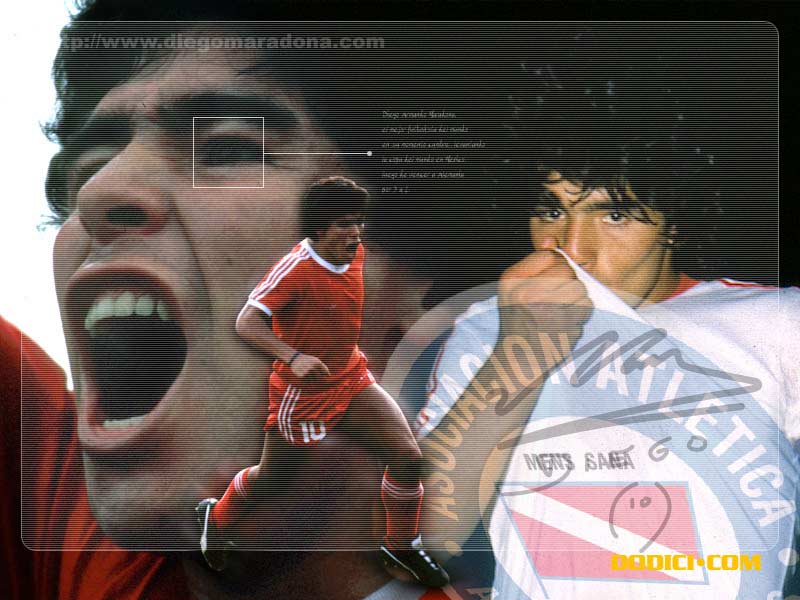
CLICK ON THE PICTURE TO GO TO MARADONA'S OFFICIAL SITE
WHO IS DIEGO ARMANDO MARADONA?
(Source : www.vivadiego.com)
Diego Armando Maradona has been the greatest football player ever!
To prove this, just think that the most beautiful goal in the history of football was scored by Maradona in the 1986 World Cup in Mexico against England, when he dribbled 6 English players and the goalkeeper scoring an amazing goal... just few minutes after his world-famous "Hand of God" goal, when he scored with his hand and the referee did not notice that!
Born on October 30, 1960 in the poor slums of Villa Fiorito in the outskirts of Buenos Aires, Diego grew up with soccer. He was nicknamed "El pibe de oro" (the golden boy): he started in Argentinos Juniors, then joined Boca Juniors and led the Argentina youth team to win the world cup in 1979. After the 1982 world cup in Spain, when he was already an idol, he joined Barcelona and played in Spain for two seasons. In 1984 he joined Napoli and won here two Italian Championships in 1986/87 and 1989/90, a Coppa Italia (1987), an UEFA cup (1989) and a Supercoppa Italiana (1990). In the mean time, he was the hero of Argentina's triumph in Mexico 1986 World Cup since he led the team to the final victory. Unfortunately, after failing a dope test in 1991 he was banned from the soccer fields. After the suspension, he went to Spain to play for Sevilla and then back to Argentina with Newell's Old Boys. Then, after a pair of coachings in Argentina, he came back to Boca Juniors.
In the World Cup of 1994 in the USA, Maradona was tested after the match against Nigeria and was found to have used "ephedrine", not permitted by FIFA. He was suspended from playing soccer for more than a year as punishment. Although Argentina came in with a strong team in the 1994 World Cup, everything went downhill and, without their captain, they were soon defeated.
After the suspension, he started playing again for Boca Juniors until 1997: on October 30, 1997, on his 37th birthday, he retired from football.
But I think Maradona should be judged for what he showed on the football fields in every part of the world, and not for his private life, and what he has shown is something really unique and unforgettable. Thank you, DIEGO.
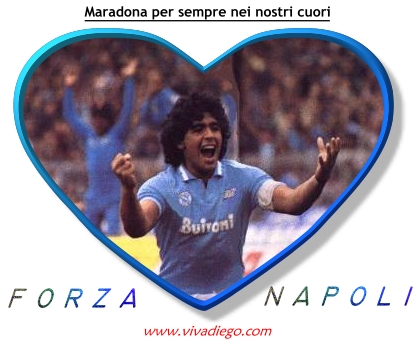
CLICK ON THE PICTURE TO GO TO www.vivadiego.com
Diego Armando Maradona profile
Argentine star immortalized despite controversy
(Source : www.cnnsi.com)
Born: October 30, 1960
International record: 90 caps for Argentina (34 goals)
Clubs: Argentinos Juniors, Boca Juniors, Barcelona (Spain), Napoli (Italy), Sevilla (Spain), Newell's Old Boys, Quilmas
It is testament to Diego Maradona's extraordinary talents that such a controversial figure should be immortalized as one of the greatest players of the century.
Maradona, who emerged from the slums of Buenos Aires to play for Argentina as a stocky 16-year-old, achieved so much, yet the feeling remains that he somehow wasted his talent, his later career and retirement having been blighted by drug problems.
His finest hour came in 1986 when he single-handedly won the World Cup in Mexico for Argentina. His quarterfinal performance against England summed up Maradona in all his arrogant brilliance as he punched the ball into the net with his hand to open the scoring and then immediately danced through England's defense to score possibly the greatest individual goal in the history of the sport.
Maradona afterwards said his first had been "a little bit of Maradona's head, a little bit of the hand of God." The second was pure Maradona.
An Italian champion at Napoli in 1987 and 1990, he returned to the World Cup stage in 1990. Argentina reached the final again but its ugly football and graceless behavior meant few shared Maradona's tears after a defeat by West Germany.
In 1991, Maradona received a 15-month ban from the game after testing positive for cocaine. An initially spectacular comeback at the 1994 World Cup in the United States also ended with Maradona being banned after failing a drug test, effectively ending his playing career.
Maradona recently celebrated his 40th birthday in Cuba recuperating from a near-fatal cocaine overdose in January, a bloated parody of his former glory.
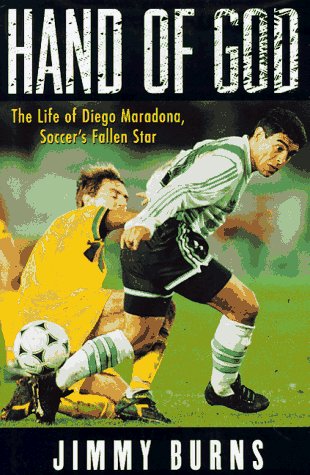
Hand of God : The Life of Diego Maradona
by Jimmy Burns
Reviews
Source : Amazon.com
The playing fields of the '80s and '90s are sadly littered with the unfulfilled promises of athletic greatness deterred by self-destruction. Soccer star Diego Maradona rose from the slums of Buenos Aires to teenage fame and a career that blazed its way across Europe before reaching apotheosis in the 1986 World Cup. That World Cup performance, in which Maradona raised his already magnificent game an impossible notch or two, elevated him to a sporting pantheon reached only by a supernatural handful: think Michael Jordan, Muhammad Ali, and Pel. But, as biographer Jimmy Burns painfully details, the charismatic and stormy Maradona quickly lost everything to drugs, scandal, and corruption. Maradona's is a cautionary tale, and Burns relates it with charisma. 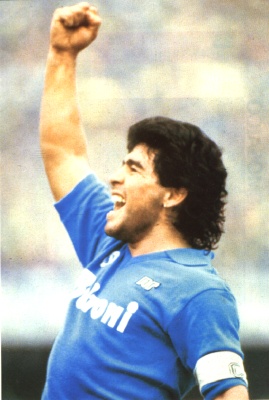
Maradona, Diego
(Source : http://encarta.msn.com)
Maradona, Diego (1960- ), Argentine soccer player, who led Argentina to a World Cup title in 1986. An outstanding midfielder, considered the heir to Brazilian player Pel as the world's best player, Maradona earned praise and respect from players and fans for his brilliant play-making and goal-scoring abilities. He achieved celebrity status throughout the world and led a highly visible and extravagant life.
He was born Diego Armando Maradona in Lans, near Buenos Aires. The son of a factory worker, he began playing soccer for Las Cebollitas, a children's team, at the age of nine. At the age of 16 he was the youngest player to join Argentina's national team. Though he was already a star when Argentina hosted the World Cup in 1978, Maradona was not selected for that year's national team and did not participate in his country's victory in the tournament. In 1979, however, he was voted South American player of the year. He led Argentina to its second World Cup title in 1986 and to the finals in 1990. He played for the professional soccer team of Barcelona in Spain from 1982 to 1984 and was then acquired in 1984 by Napoli, an Italian team from the city of Naples. With his help Napoli won the Italian League title for the first time in 1989.
Maradona encountered career problems after he was accused of drug use in 1991. That year he was dropped by the Naples team and barred from international competition for 15 months while facing drug charges in Argentina. In September 1992 he rejoined international soccer when he was signed by Seville, a team from Seville, Spain. Maradona struggled with Seville and was released by the team after one season. Despite having admitted that the training sessions overwhelmed him, he returned to Argentina in 1993 to attempt another professional comeback. During the 1994 World Cup, however, Maradona received a 15-month suspension from international competition for testing positive for banned drugs. He subsequently became coach of the Argentine soccer team Racing Club, but he resigned the post in mid-1995. Later that year, when his playing ban expired, Maradona joined the Boca Juniors team of Buenos Aires, Argentina.
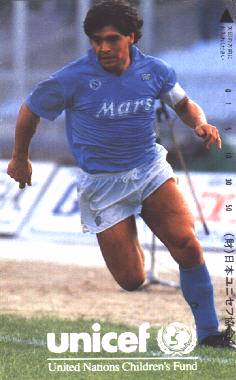
Every goal scored by Maradona with Argentina!
(Source : www.vivadiego.com)
Here's the list of the 34 goals scored by Diego Maradona:
02/06/1979 (friendly)
Scotland-Argentina 1-3 1 goal
08/08/1979 (America Cup)
Argentina-Bolivia 3-0 1 goal
01/05/1980 (friendly)
Argentina-Ireland 1-0 1 goal
21/05/1980 (friendly)
Austria-Argentina 1-5 3 goals
09/10/1980 (friendly)
Argentina-Bulgaria 2-0 1 goal
12/10/1980 (friendly)
Argentina-Poland 2-1 1 goal
04/12/1980 (friendly)
Argentina-USSR 1-1 1 goal
16/12/1980 (friendly)
Argentina-Switzerland 5-0 1 goal
04/01/1981 (Copa de Oro)
Argentina-Brazil 1-1 1 goal
18/06/1982 (World Cup 1st round)
Argentina-Hungary 4-1 2 goals
10/05/1985 (friendly)
Argentina-Paraguay 1-1 1 goal
14/05/1985 (friendly)
Argentina-Chile 2-0 1 goal
27/05/1985 (World Cup qualif.)
Venezuela-Argentina 2-3 2 goals
09/06/1985 (World Cup qualif.)
Argentina-Venezuela 3-0 1 goal
14/11/1985 (friendly)
Argentina-Mexico 1-1 1 goal
15/05/1986 (friendly)
Israel-Argentina 2-7 2 goals
06/06/1986 (World Cup 1st round)
Argentina-Italy 1-1 1 goal
22/06/1986 (World Cup quarter-finals)
Argentina-England 2-1 2 goals
25/06/1986 (World Cup semifinal)
Argentina-Belgium 2-0 2 goals
10/06/1987 (friendly)
Italy-Argentina 3-1 1 goal
27/06/1987 (America Cup)
Argentina-Peru 1-1 1 goal
02/07/1987 (America Cup)
Argentina-Ecuador 3-0 2 goals
31/03/1988 (4 Nations' Cup)
Argentina-USSR 2-4 1 goal
22/05/1990 (friendly)
Israel-Argentina 1-2 1 goal
20/04/1994 (friendly)
Argentina-Morocco 3-1 1 goal
21/06/1994 (World Cup 1st round)
Argentina-Greece 4-0 1 goal
And here is the list of his goals scored with the Argentina youth team: 13/01/1979 (South America Cup)
Argentina-Peru 4-1 1 goal
18/08/1979 (friendly)
Argentina-Mexico 2-1 1 goal
26/08/1979 (Youth World Cup)
Argentina-Indonesia 5-0 2 goals
30/08/1979 (Youth World Cup)
Argentina-Poland 4-1 1 goal
02/09/1979 (Youth World Cup)
Argentina-Algeria 5-0 1 goal
04/09/1979 (Youth World Cup)
Argentina-Uruguay 2-0 1 goal
07/09/1979 (Youth World Cup)
Argentina-USSR 3-1 1 goal
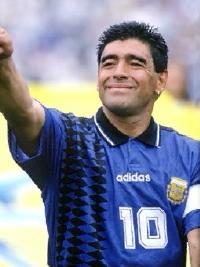
Diego Armando Maradona
(Source : www.sportsstarpages.com)
Diego Armando Maradona was born on October 30, 1960 in Villa Fiorito in the outskirts of Buenos Aires. Diego grew up with soccer. He was nicknamed "El pibe de oro" (the golden boy). He started in Argentinos Juniors, then joined Boca Juniors and led the Argentina youth team to win the world cup in 1979. After the 1982 world cup in Spain, when he was already an idol, he joined Barcelona and played in Spain for two seasons. In 1984 he joined Napoli and won here two Italian Championships in 1986/87 and 1989/90, a Coppa Italia (1987), an UEFA cup (1989) and a Supercoppa Italiana (1990).
In the mean time, he was the hero of Argentina's triumph in Mexico 1986 World Cup since he led the team to the final victory. Unfortunately, after failing a dope test in 1991 he was banned from the soccer fields. After the suspension, he went to Spain to play for Sevilla and then back to Argentina with Newell's Old Boys. Then, after a pair of coachings in Argentina, he came back to Boca Juniors. In the World Cup of 1994 in the USA, Maradona was tested after the match against Nigeria and was found to have used "ephedrine", not permitted by FIFA. He was suspended from playing soccer for more than a year as punishment. Although Argentina came in with a strong team in the 1994 World Cup, everything went downhill and, without their captain, they were soon defeated. After the suspension, he started playing again for Boca Juniors until 1997. On October 30, 1997, on his 37th birthday, he retired from football(soccer).
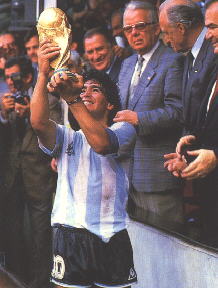
HALL OF FAME - DIEGO MARADONA
(Source : www.royoftherovers.com)
Maradona, Diego
Born: 30th October 1960, Position: Centre Forward
Argentinos Juniors (Argentina), Boca Juniors (Argentina), Barcelona (Spain), Napoli (Italy), Sevilla (Spain), Newell's Old Boys (Argentina), Boca Juniors (Argentina) and Argentina.
Major Honours: World Cup 1986; World Footballer of the Year 1986 and UEFA Cup 1988
Relevant Career Statistics: 90 caps and 34 International goals.
Admitted to the Hall of Fame: 1st January 2000 with 36% of the votes.
Not Roy of the Rovers off the pitch but Diego Maradonna the Player of the Century is most certainly Roy of the Rovers on the pitch (except for that "hand of god!").
Diego Maradona was much more than the world's greatest footballer throughout the 1980's and early 1990's. He was also the most controversial and the most enigmatic, unable to appear in public or on a football pitch without arousing the most contrasting of emotions. His admirers in Argentina, where he enjoyed early glory with Argentinos Juniors and Boca Juniors, considered him little Iess than a god and in Italy where he triumphed with Napoli they worshipped his bootlaces. So did all of Argentina after Maradona reached the zenith of his career, when he captained his Country to victory in the 1986 World Cup finals in Mexico.
Where it all went wrong is anyone's guess, but it began in the working-class Fiorito suburb of Lanus in the province of Buenos Aires where Maradona began playing for a kids' team named Estrella Roja (Red Star) at the age of nine. Later he and his friends founded a team known as Los Cebollitas (The Little Onions) who were so promising that the whole side was signed up en bloc by unfashionable first division club Argentinos Juniors and turned into one of the club's youth sides.
On 20th October 1976, Maradona (wearing No. 10) made his league debut as a 15-year-old substitute against Talleres Cordoba and a week later he played his first full match against Newell's Old Boys from Rosario. In February 1977 he made his debut for Argentina as a substitute for Rene Houseman in a 5-1 victory in a friendly against Hungary. It appeared odds-on that Maradona would be a member of the squad with which manager Cesar Luis Menotti planned to win the World Cup for Argentina for the first time in front of their own fanatical fans in 1978. Menotti included Maradona in a preparatory squad of 25 players but he was one of the three players dropped on the eve of the finals.
It was months before he would speak to Menotti again. but their eventual peace talk paved the way for the first international success of Maradona's career at the 1979 World Youth Cup in Japan. Boca Juniors bought him for a world record 1 million, then later resold him to Spain's Barcelona for a further record 3 million. Before joining the Catalans he succumbed to the pressures of his World Cup, in Spain in 1982, where he was sent off for an awful lunge at Batista of Brazil. It was the recurring theme of his career: a unique talent for football shadowed by a similarly unique ability to arouse controversy. It says much for the magical technique of his left foot that, despite all the negative vibes, Maradona continued to entrance the game.
In 1984 Napoli paid another world record, this time 5 million, to end his injury-battered two-year stay with Barcelona. Napoli president Corrado Ferlaino had all manner of problems raising the money. But he was repaid within weeks as Napoli sold a staggering 70,000 season tickets. Two Italian league championships and one UEFA Cup success were the reward for the fans while souvenir merchants did a roaring trade in Maradona wigs.
He will perhaps be best remembered for the 1986 World Cup where he captained his country to victory. English fans still rage over his "Hand of God" goal in the quarter-final in Mexico City but Argentine fans remember most clearly his other goal in that game when he collected the ball inside his own half and outwitted five defenders and goalkeeper Peter Shilton before gliding home one of the greatest goals in the history of the World Cup. He provided a repeat against Belgium in the semi-finals: another brilliant slalom through the defence but from the left, not the right. Then in the final against Germany, it was Maradona who provided the slide-rule pass which sent Jorge Burruchaga away to score the dramatic winner.
Maradona's great ability made his subsequent fall all the greater. His love affair with Italian football went sour after the 1990 World Cup when Argentina defeated the hosts on penalties in the semi-final in Maradona's adopted home of Naples. The following spring a dope test showed cocaine traces. He was banned from Italian and then world football for 15 months. He left Napoli in 1991 after seven glorious, roller-coaster years. He returned to Argentina and was arrested there for cocaine possession. Released on probation, he sought to revive his playing career in Spain but half a season at Seville proved a disaster when even their coach Carlos Bilardo, who had been his World Cup-winning coach in Mexico, grew tired of his stormy ways.
Back in Argentina he turned briefly to coach Deportivo Mandiyu, then Racing, before undertaking two more playing comebacks first with Newell's Old Boys. then with his old love Boca Juniors. He even returned to the World Cup stage but that ended in the greatest humiliation of all when he was banished from the 1994 finals in the United States after failing another dope test.
His last match was with Boca juniors on 25th October 1997 winning 1-2 away against River Plate and on 30th October 1997 he decides to retire from football on the day of his 37th birthday.
In 1999 he agrees to a movie about his life and takes part in the Italian movie "Tifosi".
On 11th December 2000 he is named as FIFA's Internet Player of the Century following an on-line poll and such recognition means that Diego Maradona is admitted into the Roy of the Rovers Hall of Fame.
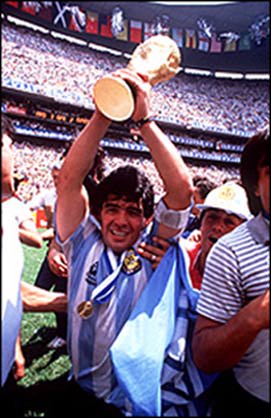
Maradona: I'll play for my country again
Buenos Aires
(Source : www.soccernet.com)
SPECIAL REPORT: Unthinkable, unbelievable, surely no more than a joke. In any other country and with any other former footballer, perhaps.
Maradona: Fighting fit
(BenRadford/Allsport)
But there was no hint of humour in Diego Maradona's bold statement of intent to play one more time for Argentina, at the age of 40 and barely a year after his drug-induced flirtation with death.
'I want to play one more time for my country, it is true,' said Maradona. 'But only against Brazil. No matter what mistakes I have made with drugs, I am still Maradona. I am still El Diego.'
That he wants to make this final appearance against his country's hated rivals should have provoked a few giggles but no, not here in Buenos Aires. In fact, most people, including several key figures at the Argentine FA, seem to think it's a good idea.
So, serious consideration is being given to his request to play in the last game of the country's World Cup qualifying group, against Brazil on September 5, 2001, by which time Argentina should have already qualified for the 2002 Finals.
Therein lies the problem, not only for the man himself but for the doctors and true friends who want him to kick - for good - the cocaine habit which dragged him too close to the grave for anybody's comfort.
Welcome, once again, to the self-deluded, adulation-fuelled world of football's most notorious hero and most acclaimed villain.
It is a world where not even his closest friends, not even the man who was a footballing father to him, can dare to tell him that he once again stands on the precipice, staring into the abyss and seeing only visions of immortality.
This week, Maradona has been back in the Argentine capital, playing a central role in the celebrations of his beloved Boca Juniors, the newly-crowned Intercontinental champions.
Banned from entering Japan to watch the final against Real Madrid, he has instead become cheerleader-in-chief, working himself into a frenzy along the way. Singing with local pop stars, dancing on rooftops, urging on thousands of revellers from a balcony... he is seizing the moment and wringing it dry.
Contrasted with the shocking pictures of him being carted into an ambulance as recently as January, following his collapse in the Uruguayan resort of Punto del Este, he looks a picture of health. His two-stone weight loss since then is dramatic.
The only shadow hanging over that is the memory of him being kicked out of the 1994 World Cup after tests discovered a cocktail of drugs in his system - drugs which had helped him lose weight and regain physical power following a 15-month worldwide ban for testing positive for cocaine.
For all his faults, Maradona remains a hero in Argentina, with the Boca fans singing his name as they welcomed their team back from Tokyo yesterday.
Maradona remains, essentially, the same wilful, self-destructive tragedy-in-waiting as the wretched figure who lay in hospital 10 months ago. The same inner circle - the 'friends' who never lifted a finger to stop him from destroying his body - is virtually intact, while much of his time here this week has been spent in party mode.
The over-riding feeling is that, if he has not already relapsed, it can only be a matter of time.
Sergio Batista, who played alongside Maradona in the 1986 and 1990 World Cups, was one honest friend among the nest of nodding vipers when Maradona's body finally broke down earlier this year.
Having eventually defeated his own cocaine addiction after seven years, Batista warned then that Maradona had to leave the country, change his whole lifestyle and avoid anyone or any place connected to his old abusing ways.
Batista, the new coach of Argentinos Juniors, where both players started their careers, tried to be optimistic as he declared: 'He hasn't done enough yet.
'I don't know if he has made it out. He is in a good way so far and I hope he makes it. The circle of friends around him hasn't changed so much. But the one who has changed is Maradona - I think.
'I played in a game with him a couple of weeks ago and he was very happy, looking much better.
'He knows he is in a difficult fight. It is not easy but the important thing is that he is enthusiastic, happy and trying to enjoy life, his family and friends. This is the one thing which will carry him out of his problems.'
If Batista paints a bright picture for the future, others are more pessimistic.
Diego Borinsky, a senior journalist at El Grafico magazine, said: 'The people around him know that he is still taking drugs but they just say "Yes, Diego" and do nothing.
'Having said that, he is uncontrollable. What Maradona wants to do, Maradona does. Only recently he crashed his car in Cuba, driving on the wrong side of the road.
'A guy called Ferro Vieira was with him in Cuba. He was also with him before he collapsed in Punto del Este - and he is being investigated by Interpol for drugs. What does that say?
'Wherever he goes, he is always going to have the same kind of problems. Drugs are a trip you can go on but you can't always return.
'The day Maradona dies will be terrible, more tragic even than Eva Peron.
'What is he doing with himself? Maradona works off Maradona, demanding money for interviews and selling his story. A week after he collapsed in Uruguay, he was doing an interview in the hospital for $100,000.'
Maradona also raked in more than $1million in advances for his autobiography, sales of which were boosted by his decision to become head coach of lowly Almagro a month ago, although he has never been to a game, has attended training only once and said this week: 'Don't ask me about Almagro. I haven't even signed a contract.'
The book is as madcap as you would expect, containing everything from outbursts aimed at FIFA and Pele to musings on the nature of life.
Not everyone is amused and entertained, least of all the man who took an eight-year-old Diego out of the barrios and guided him through to the Argentinos Juniors first team.
Francisco Cornejo, much more than a coach during Maradona's formative years, now runs a football school called, naturally, San Diego but fears that his most famous pupil is beyond further education.
'Can I help him now? No. I realise that I could do absolutely nothing for him,' said Cornejo, sounding like a man with a broken heart.
'If I did something it would ruin our relationship. I think what everybody thinks about the current situation but I don't want to make him angry over an opinion which will be very hard to express. I am very sad about it.
'It is like a son of mine is having these troubles but there is none of the boy I knew left in Maradona.'
For all of his years in service, even Cornejo does not appear to have either the influence or the courage, or as they say here the cojones, to bring Maradona to his senses.
That said, it may take the second coming of Jesus himself to crack this man's invincibility complex.
Asked if he fears death, Maradona said simply: 'I cannot die until all four Beatles are in heaven. Only one is there now, so I am safe.'
This does not sound like a man in touch with reality.
Yet, how could he be? Feted like a demi-god during his recent extended birthday celebrations, which included a charity match, he can always find someone to agree with him.
Fernando Pacini, a journalist at La Red radio and a fairly close friend of Maradona, tried to balance his relationship with objectivity as he explained: 'I was with him for some time in Cuba and I can say that he is better now than he was then. His muscles are still in bad shape but he is taking precautions.
'I don't know when his medical trouble will be over but his rebuilding isn't finished yet, he knows that. He has to take care every day.
'He was very calm in Havana. He had an easy life but he was lonely. Here, well, he is Maradona.
'I don't know what will happen next but I know he wants to play against Brazil and I think he would do very well. I think the idea makes sense and I know people in charge of the game here would be happy for it to happen.'
The Argentinians, of course, would love to lord it over struggling Brazil by sending out a 40-year-old to emphasise how far ahead they are of their rivals.
El Diego, having suffered at the hands and studs of Brazil in the past, would also relish such an occasion.
As for what he does after then, God only knows if he will ever find a way to live without football or without drugs.
Typically, though, he remains unrepentant about what has gone before - and bullish about the way ahead.
'I can look the world in the face,' he says in the book. 'I didn't s*** on anyone except myself and, apart from my family, I don't owe anybody anything.
'I'm fighting for my life day-in, day-out. I've got my folks around me. I've got my friends around me. I've got my wife's unconditional support. I've got two daughters who are as lovely as I always dreamed they would be.
'On top of that I've got the respect of the country I love. In spite of everything, I've got Argentina's respect and I really revel in it.'
That unconditional love, from friends, family and virtually an entire country, is probably doing Maradona more harm than good.
Yet, without it, his fragile ego dictates that he would not last a minute. Inflated by it, he cannot see the dangers which still lurk in the darkness just beyond the glare of the spotlight.
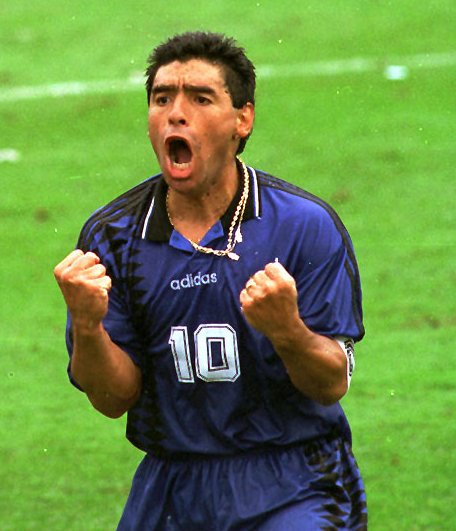 | 
| 
|


